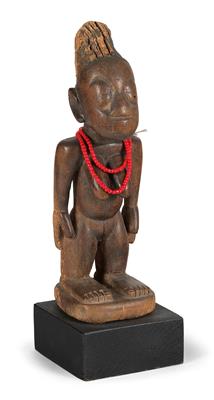Yoruba, Nigeria: an old, female ‘Ibeji’ twin figure, with eroded upper hairstyle. Style: Oshogbo, Oyo.
Yoruba, Nigeria: an old, female ‘Ibeji’ twin figure, with eroded upper hairstyle. Style: Oshogbo, Oyo.

Among the Yoruba, in Southwest Nigeria, there is an above-average rate of twin births. For the Yoruba, twins have special significance. They are considered to bring good fortune and blessing to their family. They have their own god, ‘Ere Ibeji’, and are honoured, sung to, etc. The Yoruba believe that twins only have one soul between them. If a twin dies, then such a ‘proxy figure’ must quickly be carved. A professional carver of the region does this. These figures, called ‘Ibeji’, are then venerated, cuddled, washed and fed, like a living twin. They are carried along by the mother, or placed on a house altar. The present, female ‘Ibeji’ twin figure is visibly old and long ‘cared for’. It is made of light-coloured hard wood, stands on a rounded base and wears a long necklace of small, red glass beads. Her hairstyle, towering above her head, is eroded due to age and weathering. There is an inventory number, in white letters, on the underside of the base. Style: Oshogbo, Oyo.
Height: 21.5 cm; width: 7 cm.
First third of the 20th century. (ME)
Provenance:
South African private collection.
Lit.:
‘Ibeji. The cult of Yoruba Twins’ by George Chemeche, ill. 69 to 77.
Esperto: Prof. Erwin Melchardt
 Prof. Erwin Melchardt
Prof. Erwin Melchardt
+43-1-515 60-465
erwin.melchardt@dorotheum.at
20.02.2017 - 14:00
- Prezzo realizzato: **
-
EUR 375,-
- Prezzo di partenza:
-
EUR 200,-
Yoruba, Nigeria: an old, female ‘Ibeji’ twin figure, with eroded upper hairstyle. Style: Oshogbo, Oyo.
Among the Yoruba, in Southwest Nigeria, there is an above-average rate of twin births. For the Yoruba, twins have special significance. They are considered to bring good fortune and blessing to their family. They have their own god, ‘Ere Ibeji’, and are honoured, sung to, etc. The Yoruba believe that twins only have one soul between them. If a twin dies, then such a ‘proxy figure’ must quickly be carved. A professional carver of the region does this. These figures, called ‘Ibeji’, are then venerated, cuddled, washed and fed, like a living twin. They are carried along by the mother, or placed on a house altar. The present, female ‘Ibeji’ twin figure is visibly old and long ‘cared for’. It is made of light-coloured hard wood, stands on a rounded base and wears a long necklace of small, red glass beads. Her hairstyle, towering above her head, is eroded due to age and weathering. There is an inventory number, in white letters, on the underside of the base. Style: Oshogbo, Oyo.
Height: 21.5 cm; width: 7 cm.
First third of the 20th century. (ME)
Provenance:
South African private collection.
Lit.:
‘Ibeji. The cult of Yoruba Twins’ by George Chemeche, ill. 69 to 77.
Esperto: Prof. Erwin Melchardt
 Prof. Erwin Melchardt
Prof. Erwin Melchardt
+43-1-515 60-465
erwin.melchardt@dorotheum.at
|
Hotline dell'acquirente
lun-ven: 10.00 - 17.00
kundendienst@dorotheum.at +43 1 515 60 200 |
| Asta: | Tribal Art |
| Tipo d'asta: | Asta in sala |
| Data: | 20.02.2017 - 14:00 |
| Luogo dell'asta: | Wien | Palais Dorotheum |
| Esposizione: | 11.02. - 20.02.2017 |
** Prezzo d’acquisto comprensivo dei diritti d’asta acquirente e IVA
Non è più possibile effettuare un ordine di acquisto su Internet. L'asta è in preparazione o è già stata eseguita.
